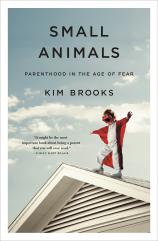Small Animals: Parenthood in the Age of Fear
Review
Small Animals: Parenthood in the Age of Fear
In March 2011, Kim Brooks left her four-year-old son in the car unattended while she ran into Target to buy him headphones for a flight they were taking about two hours later. The day was mild, the area was suburban and safe, and Brooks could see her car from the checkout lane. When she returned to her vehicle, her son barely registered her existence, as he was totally immersed in his tablet. The most stressful part of the day at that point was how she was going to manage to feed, dress and herd her two young children onto a plane alone.
Luckily for Brooks, the flight went by without any major struggles. However, this perhaps would be her last moment of peace for several years. Unbeknownst to her, a “Good Samaritan” had noticed her son alone in the car and filmed him before reporting her parenting to local police. By the time she landed at home in Chicago, she was greeted by her pale-faced, stricken husband, who said only, “Call your mother.”
Before Brooks knew it, she was on the phone with the police and a lawyer, forced not only to defend her parenting techniques but also to confront herself. Was she really a good mom who made one bad decision? Or was she a monster, the kind of mom who let her kids gallivant among molesters, kidnappers and murderers? The truth is, it’s hard to say. The Good Samaritan who made that first phone call clearly knew on which side of the argument he or she landed, but what about the rest of us? What about Brooks herself?
"[Brooks'] research is thorough and highly illuminating, but definitely at its strongest when she is clearly impassioned. Reading SMALL ANIMALS feels like enjoying a particularly stimulating conversation with a friend over coffee."
In SMALL ANIMALS, Brooks seeks not to defend herself or walk readers through the grueling years of court dates, panic and punishment that followed that sunny March day. Instead, she explores the “why” of it all. Why did that Good Samaritan feel he or she was doing the right thing? What had changed from the “good old days,” when children as young as eight or nine could walk down to the convenience store to buy milk for the baby, or cigarettes for their perfectly polished 1950s parents? Why have our notions of what it means to be a “good parent” changed so drastically over the years? Have we become more informed, or only more fearful? To answer these questions and more, Brooks explores both the legal and cultural forces shaping American parenting, fearlessly and brilliantly illuminating the influences of the media, socioeconomic class and the watchful gaze of other parents.
One of the first points Brooks explores in SMALL ANIMALS is the difference between what her parents would have defined as good parenting and what we define it as today. She explains that one huge, life-changing difference between then and now is the choice to have children. Whereas having children was just something her parents (and my parents, and your parents) just did, to have a child now is seen as “a thing you in particular have chosen, a special duty and responsibility that only some accept.” As a result, the stakes become much higher, and tragically our tolerance for different parenting styles becomes much more complicated.
In our current time, this means that parents are judged first for having children, but then, once the child is born, they are judged for a multitude of other, sometimes uncontrollable things: Is the child fed/clothed/healthy? Okay, now is the child socially active/intelligent/a good citizen? The problem, Brooks argues, is when we conflate these qualities so that a parent with a child who, for example, does not participate in clubs at school is judged as harshly as a parent who has not fed his or her child for a week. Thus parenting in the age of fear. Being a parent --- especially a mother --- is without a doubt one of the most difficult jobs in the world, and Brooks argues that adding an unnecessary level of surveillance is not only irrational but harmful.
Brooks goes on to explore several different waves of parenting and their political influences, always tying the events back not only to her story, but to the current climate of parenting. She speaks to psychologists, doctors, lawyers and everyone in between, including her own friends --- some of whom hold wildly different ideas about parenting than herself. Her research is thorough and highly illuminating, but definitely at its strongest when she is clearly impassioned. Reading SMALL ANIMALS feels like enjoying a particularly stimulating conversation with a friend over coffee. Brooks does not whine, cajole or beg; she simply asks the questions.
Refreshingly, Brooks is not afraid to confront her own privilege. When she learned that there was a warrant out for her arrest, nearly two years after she left her son in the car, she was able to get her lawyer on the phone, fly back to Virginia, pay a fine, and complete some relatively low-impact community service to have the moment practically erased. But what if she had been a woman of color? What if she could not afford the plane ticket back, or the fine? Brooks does speak to women of different races and classes, but does not claim to be able to tell their stories, and through them the idea of parenting in the age of fear is amplified tenfold.
In the end, the matter of “free-range” parenting --- or even making a single bad decision --- will always be a gray area. Brooks cannot change the minds of those who believe her to be a monster, nor can she encourage truly bad parents to change for the better. What she can do, and has done beautifully in SMALL ANIMALS, is ask her readers to give mothers the right to be rational, and change the language from one of criminalizing and shaming to one of supporting and cooperating.
Reviewed by Rebecca Munro on August 24, 2018
Small Animals: Parenthood in the Age of Fear
- Publication Date: August 20, 2019
- Genres: Memoir, Nonfiction, Sociology
- Paperback: 256 pages
- Publisher: Flatiron Books
- ISBN-10: 1250089573
- ISBN-13: 9781250089571




